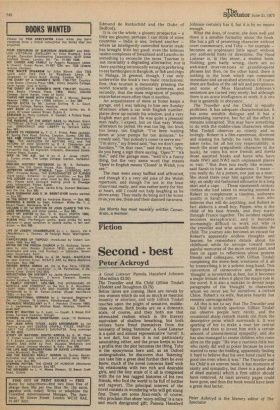Fiction
Second best
Peter Ackroyd A Good Listener Pamela Hansford Johnson (Macmillan £3.50) The Traveller and His Child Gillian Tindall (Hodder and Stoughton £3.75) Better times are coming. Here are novels by two women which do not so much as mention insanity or abortion, and only Gillian Tindall touches upon the plight of sensitive, middleclass women. Both books are on a domestic scale, of course, and they both use that attenuated realism which is the literary equivalent of shallow breathing, but both writers have freed themselves from the necessity of being 'feminine'. A Good Listener is a quiet and almost representative 'novel': it is not dull, but then it is not particularly astonishing either, and the prose keeps so low a profile that the plot becomes the thing. Toby is the eponymous hero and, as an Oxford undergraduate, he discovers that 'listening' can take him a great deal further than he ever knew; much of the novel concerns itself with his relationship with two rich and desirable girls, and the tiny scale of it all is completed with the no less ragged histories of his two friends, who find the world to be full of nettles and ragwort. The principal interest of the novel consists in wondering who will get stung first. There are some faux-naifs, of course, who proclaim that sheer 'story-telling' is a rare and much denigrated gift; Pamela Hansford
Johnson certainly has it, but it is by no means enough.
What she does, of course, she does well and there is a sensible formality about the book. She has a gift of presenting character without overt commentary, and Toby for example becomes an unpleasant little squirt without any authorial hints or directions. The Good Listener is, in this sense, a modest book. Nothing goes badly wrong, there are no awkward interventions or grandiloquent phrases but then, on the other hand, there is nothing in the book which can command immediate and astonished attention. Of course there are flashes of the old wit and percipience, and some of Miss Hansford Johnson's sentences are turned very nicely; but although there is an acute intelligence at work, it is one that is generally in abeyance.
The Traveller and his Child is equally proficient. It has adequate characterisation, it has some sensible dialogue and it has a painstaking narrative, but for all the effort it remains uninspired. This may have something to do with the middle-class characters whom Miss Tindall observes so closely and so lovingly. Robert is a film-camerman, divorced and missing his family; he visits his lesbian sister (who, for all her coy respectability, is much the most sympathetic character in the book), he visits his nice friends and meets those assorted freaks and bores who have made NW1 and NW3 such unpleasant places to visit: "'But then you really like women,' said Sarah to him in an undertone. 'I mean you really do. As a person, not just as a man.' She stood there near him against the heavy sky, an oddly old-fashioned silhouette in a long skirt and a cape . .. These nineteenth century clothes she had taken to wearing seemed to Robert to complement a timeless, authentic quality in Sarah's nature . . .". A man who believes that will do anything, and Robert in fact abducts a small boy, Pippin, who is the child of his best friends, and they travel through France together. The incident rapidly becomes metaphorical, and it becomes Increasingly difficult to work out who is the traveller and who actually becomes the child. The journey also becomes an excuse for Robert's apparently endless thoughts and fancies; he remembers details about his childhood while he swoops toward more painful memories of the more recent past, and then on again to reflections about present friends and colleagues, with Gillian Tindall completing the down-beat weariness of it all by transcribing it in a solemn long-hand. This convention of consecutive and descriptive 'thought' is novelettish at best, but it becomes a major irritant when it plays the major role in the novel. It is also a mistake to devote large paragraphs of the 'thought' to characters whom we never see for ourselves: a certain Chloe, Robert's ex-wife, features heavily but remains unrecognisable.
All this is not to say that The Traveller and his Child is entirely spurious. Gillian Tindall can observe people very nicely, and the occasional sharp remark stands out from the descriptive prose which surrounds it. It was sporting of her to make a man her central figure and then to invest him with a certain amount of unsentimental sympathy, and she has also managed to create children who come alive on the page: "He was a cautious little boy who rarely did well at poker because he never wanted to raise the bidding, apparently finding it hard to believe that his own hand could be a good one even when it was." The Traveller and his Child is an uneven book; it has moments of sanity and sympathy, but there is a good deal of dead material which a firm editor should have removed, At least seventy pages could have gone, and then the book would have been a great deal better.
Peter Ackroyd is the literary editor of The Spectator


































 Previous page
Previous page